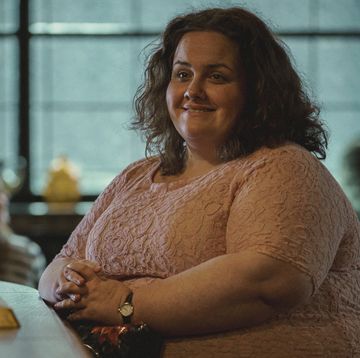Confidence is the key to contentment, success and self-acceptance. So how do you get it?
Here are some inspiring thoughts on how to be happy from the inside out.
How to dress like yourself, by Anne-Marie Curtis, ELLE Fashion Director
1. Be yourself, everyone else is already taken. (Thank you, Oscar Wilde.)
This is staggeringly obvious, but actually easier said than done. We live in a world where women are constantly compared, critiqued and told who they should be, so it’s hardly surprising we lose our fashion mojo under the pressure. Here’s the thing (and I’m going to be completely honest): unless you’re a supermodel, not everything will work on you. There is a reason models do the job they do. They are preternaturally tall and slim, young and very beautiful. That whole off-duty model thing looks great on an off-duty model, but that’s because they would look good in anything, so be kind to yourself and don’t compare. Instead, look around and see whose style you really admire, whether it’s Beyoncé or Phoebe Philo or that girl you see at the bus stop every day. What is it about their style that works for them? Take notes, adapt it and make it work for you.
2. Make fashion your friend.
Even for those of us who work in the industry, fashion is scary sometimes. All that ‘in’ and ‘out’ and ‘must have’ can touch on our deep-rooted insecurities of being the odd one out/the unpopular girl/not part of the cool gang. My advice? Stop obsessing. Think of fashion as a friend who makes you laugh, feel good about yourself and who you sometimes want to do shots with on a school night. Not the girl who makes you feel unhappy/insecure/anxious whenever you see her. Take part in the new-season trends you like and simply ignore the rest. Sometimes it might just mean changing your shoes to keep your look current, and that’s fine. Fashion is supposed to be fun. It’s not a competition and it shouldn’t make you feel bad – ever. There is joy in choosing what to wear every day; just make sure you are dressing for yourself and not to keep up with other people.
3. Rules are meant to be broken.
Fashion magazines are full of advice on How To Dress. That’s our job. But it doesn’t mean all of it applies to you all of the time. There’s certainly something to be said for seeking out the perfect ‘investment trench coat’, but the truth is, not everyone looks good in a trench coat. Sometimes it can make you look like Inspector Clouseau. In which case, step away. Most of us can work that out by looking in the mirror – if you’re not happy with what you see, just take it off. If you are really not sure, ask a friend you trust – you know, the one you do shots with on a Tuesday.
4. Try it, you might like it.
Another thing women are really good at (myself included) is deciding which things don’t work on them. As in: ‘I really don’t suit animal prints/florals/stripes.’ This can often be based on one bad experience years ago. It’s a bit like having a difficult break-up and resolving to remain single for the rest of your life. Case in point: I had avoided red for years, having made a decision it wasn’t ‘me’. I recently tried it again, starting small with a Uniqlo sweater, which I decided did work. I’ve got lots of things in red now, including a Miu Miu coat that I wear when I want to feel brave/happy/confident. So there you go. Of course, there are some things that will always look terrible on you – for me, it’s beanie hats. But that’s another story.
5. I am woman, hear me roar.
Sometimes it is not about what you’re wearing, but how. It doesn’t matter that your Acne sweater is a bit bobbly or that your Céline-esque shoes are actually from Topshop, as long as you feel good in them.
So, at the risk of sounding like your mother: stand up straight, take a deep breath and smile. Seriously, it’s amazing the effect it can have on you. Scientific studies show that smiling even when you’re not happy can make you feel happier. So look like you love how you look and chances are everyone else will, too.
How to act confident, by Bonnie Wright, actress and director
My 23 years have been a confidence roller-coaster rite of passage: from instinctive self-assurance to fearful soul-searching, working out what confidence means to me and achieving it on my own terms.
As an actress and director – although I would say this applies to any creative person – you live in constant fear that someone is going to catch you out; call you a fraud. But creativity can’t exist without this doubt – it’s what challenges us to question ideas and people, and to keep getting better.
Still, my working life requires having such a level of confidence in myself that, even if I don’t necessarily possess it, I must pretend I do. I entered the world of film-making age nine, with little to no clue of what I was doing. But on the Harry Potter set, where I played Ginny Weasley, I was so enthusiastic that my confidence was unshakeable. Then, at some point, I stopped feeling it and started ‘acting it’.
We all associate adolescence with a dip in self-esteem and it was this shift that caused me to really understand the world I was in, and in turn to adapt and rise to it. Being surrounded by talented people – the kind that change the energy of a room when they enter it – inspired me. Their presence and intensity was the perfect template for self-assurance, and by watching them I saw that if I wanted to be taken seriously by others, I must first begin to take myself seriously and find the tools that would build my confidence.
The way in which I’m doing this can loosely be summed up with a James Joyce quote from Dubliners: ‘He lived at a little distance from his body.’ If I have self-awareness and an understanding of what makes me tick, I can steer clear of situations that don’t bring out the best in me. I’ve learned that saying no to people can often be more valuable than saying yes.
Another issue I’ve long struggled with is my breathing. I’ve worked hard to strengthen it in multiple acting classes and with voice coaches. But it was only recently, upon discovering meditation, that I realised my inability to breathe deeply and well was because of my struggle to connect with my confidence. This meant that my breaths were shallow. Meditation has allowed me to find a neutral centre within; a pillar to root myself to no matter what life throws at me. Life is something that you can’t control or predict, but you can control your reaction to it.
So be curious, be interested in the world and challenge your own expectations. Life is a cycle: confidence gives peace of mind, peace of mind brings confidence. I don’t believe we are ever fully confident, that’s not a state of being anyone reaches – but faking it is, I’ve found, just as good as feeling it because the net effect is the same.
How to love confidently, by Robyn Wilder, writer
At the start of any relationship, all most of us get is a hunch about a stranger. No wonder many of them fail. The very idea that you can gauge how well you’ll rub along with someone a year from now just because they make your stomach feel funny is, as a theory, worthless.
I’ve given this matter a lot of thought lately. A few months ago I marched myself, after a history of romantic misfires and square-peg-round-hole relationships, down the aisle. I said the words ‘lawfully wedded husband’ to someone who has since only kicked me out of bed once (for snoring).
This is all a bit of a surprise because I never wanted to get married, or have children. I had a habit of dating penniless guitarists and, moreover, behaved like a clanging idiot while doing so. For instance, it never occurred to me that I didn’t actually love my first proper boyfriend. When we were 16, we split a Pizza Hut meal deal, and he whispered, ‘I love you.’ I reciprocated because it was the polite thing to do, and it set a precedent. ‘I must be in love,’ I thought, ‘because I’ve said so.’ I then spent the next four years marvelling at how love involved a lot more privately fancying other people and being accused of neglect than I’d anticipated. Then was surprised when it all ended in recriminations and the sudden arrival of a new, more attentive girlfriend.
After that, I resolved to only date people I definitely fancied, which, because I’m nothing if not a giant cliché, brought about the aforementioned string of penniless guitarists. You could always tell when a guitarist had entered the room, because I’d stop chatting and start shrugging. ‘Why have you gone all French?’ my friends would complain. Then they’d clock the leather-jacketed figure in the shadows and roll their eyes, because I was trying to mirror the cool, distant vibe he gave off. Again.
I’d spend entire dates just saying band names and the word ‘yeah’ because I thought it was the thing to do. I felt like Patti Smith (no mean feat, because my natural demeanour is more Elmo from Sesame Street). But I’d tire of all the faux-apathy or the guitarist would swan off with a girl as animated as I was pretending not to be.
It eventually became a habit to dial down the volume on aspects of my personality to suit a relationship. I have no idea where I learned this – I was brought up to be myself – but I took to editing my ‘on’ personality. I’d stifle an opinion here, tell a white lie there, present an ‘acceptable face’ to my partner. By the time my last relationship turned serious, I’d applied too much emotional Photoshop to accurately decide whether it was a good idea or not.
Nominally, we got on – cackled at the same TV shows, shared a love of dogs – but something was missing. We’d argue every six months, begging each other to be less as we were and more like something neither of us could quite define, but desperately needed. Finally, I realised my edited personality was largely the issue, and attempted to reassert my individuality. It was too late though – suddenly chiding my partner into paying attention to my hobbies or innermost musings baffled him and further collapsed my self-confidence.
I met my husband when I was raw and vodka-soaked from the break-up. I tried the self-editing shtick, but was too exhausted to put any real effort behind it. ‘I’m quite a cold person,’ I told him once, ‘I’m distant.’ ‘No, you’re not,’ he replied incredulously. ‘You’re Elmo off Sesame Street!’ And I am. I’m goofy and chatty, and as romantic as a potato. Affecting a streamlined version of this didn’t work out, so I’ve spent the past few years trying to be myself.
As it turns out, ‘myself’ isn’t that bad – and I didn’t have to go on any voyage of self-help discovery to realise it. I just had to spend enough time in my own company to notice that I wasn’t awful, and that the people who matter most in my life far prefer me au naturel to ‘fake and shruggy’.
It hasn’t been easy – being yourself means facing yourself, and all the things you’d rather avoid about your past and your family. But, although it is painful, it’s honest. I am honest, and I am now in an honest relationship, which – in a very practical sense – negates any editing. And I’m constantly learning about myself. I’d quite like to live overseas again, it turns out, and maybe write children’s fiction. Evidently, given my vintage Etsy ring, giant swollen belly and massive grin every time I feel a kick, I did want to get married and I do want children.
I wouldn’t know any of this if I hadn’t failed consistently enough at relationships. So I think the key is to fail as often as possible. Because it is less a case of being confident in love, and more just growing less crap at it. I’m still learning.
How to be quietly confident, by Leisa Millar, ELLE Content Editor
What does a confident person look like? Or sound like, in fact? Loud, perhaps? Forthright, even a bit aggressive? That’s definitely not me. You won’t find me holding court at a dinner party or shouting people down in meetings. I watch and I listen and, if I have something to contribute, I do. My confidence – and I am confident – is internal, a quiet belief in my own capabilities.
Still, when faced with extroverts – and they are roughly a two-thirds majority according to research, so they outnumber us quiet types – I am often blindsided. When out with friends, I won’t compete for airtime in a shouty debate, which I know makes some think I don’t have an opinion. In the office, I often observe rather than contribute, unsure how to cut through extrovert colleagues’ bluster. I have had to come up with strategies to deal with this, though, as in a hectic workplace, managers notice the person who is saying, out loud, on a loop, ‘I’m great!’. To be successful, I have to play the game. There is power in being a quiet person in a room full of loud people, but turning that power into influence is much trickier. Let me tell you how I approach it.
For me, it’s about finding the biting point – a level of assertiveness that allows me to retain integrity without becoming a mortifying, Apprentice-style caricature. I find this easier to convey physically rather than vocally, so I make sure I feel confident in what I’m wearing, project it in the way I sit or stand, keep my arms uncrossed. I consciously make what little I do say constructive and clear. And – the clincher – I always deliver on what I say I can do.
I’ve harnessed the power of impactful pauses and, where appropriate, silence. Others may gabble away, offering promises galore, but often, I think, while I’m sitting back and formulating a plan, they might have already shot themselves in the foot.
The sort of typically extrovert, self-proclaimed ‘ambitious overachievers’ who bellow over each other to offer 110% and do it by yesterday? Really, they’re all riddled with insecurity and doubt. Their bullishness doesn’t express confidence; in most cases, it masks a lack of it.
Another rule for the quietly self-assured: try not to put people down. Truly confident people don’t need to trample on those around them because they understand that there isn’t a finite amount of success and approval in the world – the ‘if she wins, I lose’ mentality. Instead, truly confident people are busy focusing on their own goals, not anybody else’s.
I have also learned that if things don’t come naturally to me – public speaking, for example, or leading a meeting – I have to practice them to improve. It worked for Steve Jobs: he notoriously rehearsed his legendary Apple presentations over and over again to ensure that they were perfect. It didn’t come naturally to him, and yet he’s considered one of the most captivating public speakers in modern memory.
To quote that famous introvert Albert Einstein: ‘Everybody is a genius. But if you judge a fish by its ability to climb a tree, it will live its whole life believing that it is stupid.’ Don’t let anyone make you feel that your brand of confidence doesn’t count. Start believing that it does and that it can take you anywhere.
How to face down failure, by Zoe Strimpel, journalist and author
Failure. What does it mean to you? An F in the margin of an exam paper? A pair of unworn running shoes by the door? Another question: what does success look like? For most people, that’s much harder to call to mind, and I am no exception.
An example: in the run-up to my final university exams, I began to doubt myself. Despite getting solid 2:1s and praise from tutors in my three years of studying English Literature, I had a sudden loss of nerve. I stopped going to lectures and became a master of procrastination. The very sight of the books I was meant to be devouring made me feel sick. When the exams came, I took my seat with horrifying certainty that a pass was impossible. Failure was my destiny and I gagged picturing the inevitable ‘talk’ with my parents.
In the end, it wasn’t quite that bad, but my tutors had expected a better grade and told me so. Having escaped the worst, I left with a defiant shrug: ‘I’m never putting myself through that again.’ Translation: ‘I’m not risking being shown up as a fraud and looking stupid.’ I wanted to avoid failure because of the frustration, anger and disappointment that comes with it; but also because mixed in with those emotions was an even stronger, more destructive one: shame.
As psychologist and author Guy Winch explains: ‘Shame is a psychologically toxic emotion because instead of feeling bad about our actions (guilt) or efforts (regret) it makes us feel bad about who we are as people. Shame gets to the core of our egos, our identities, our self-esteem and our feelings of emotional well-being.’
Does this description ring any bells? It does for me. Shame – that awful, all-out self-punishment – is unhelpful for anyone trying to do anything. But people prefer self-flagellation over self-compassion because, explains Dr Kristin Neff, Professor of Human Development and Culture at the University of Texas at Austin: ‘They are afraid they’ll become self-indulgent, that self-criticism is what keeps them in line. Our culture says being hard on yourself is the way to be.’
Fast-forward eight years to 2012: I am the Lifestyle Editor of a newspaper. I zip between reviewing hotels, restaurants and plays – the dream! – and I write lots, including two books about relationships. But there’s a problem: I’m not happy. I am restless, spoilt, snappy. Despite my writing about love, my relationships with men are unfulfilling. I’m constantly out looking for stimulation, but I feel neither strong nor positive, merely busy.
The problem is clear: I’m not challenging myself because the best way to avoid failure is to continue doing the same thing, on repeat, forever. I’d chosen to avoid promotions because I might not be able to handle a harder job and said no to running 10K after 10K for fear of collapsing and being trampled by fitter, faster people. But then something clicked: the idea of taking myself back to the thing that had brought about my fear of failure in the first place – by doing a post-grad degree.
My insecurities crowded in rapidly, but I managed to find a course that would accept me with my low 2:1. I found the course fascinating and hard. And I panicked. I wasn’t up to this stuff. What if I failed? The consequence of failing would be… It was the first time I’d actually followed this thought through. The answer? Nothing much.
The more I squared up to the idea of failure, the more its possibility melted away. I decided to take control: I spoke out in class, I went to every lecture, I read everything, even if it took all night, so I couldn’t hide behind any of the old excuses. I owned it. And, most importantly, I grew in confidence, such that when I received criticism it felt helpful, not crushing.
The single cord that had linked work, weight, relationships, exercise and morality had, for the past near-decade, been a certainty that I would mess it all up if I got in too deep. That cord began to loosen. I could date men and maybe if it didn’t work out, it might not be my fault. If I didn’t feel like going for a run? That was OK, too; I could try tomorrow. What would it cost me to take the idea of self-compassion seriously and cut myself some slack? Increasingly the answer was coming up the same: nothing. And the gains were obvious.
By the year’s end, I’d entirely repackaged myself in my mind’s eye. The fixed notion of what I could and couldn’t do had been challenged. On the most basic level, I had followed through the question of what the worst thing could be. And the more I looked closely at the possible outcomes I was scared of, the more they split apart.
In the end, the power to challenge failure and embrace possibility lay in exchanging my mental link between ‘failure’ and ‘success’ with a link between ‘opportunities’ and ‘success’. Try it: what’s the worst that can happen?












